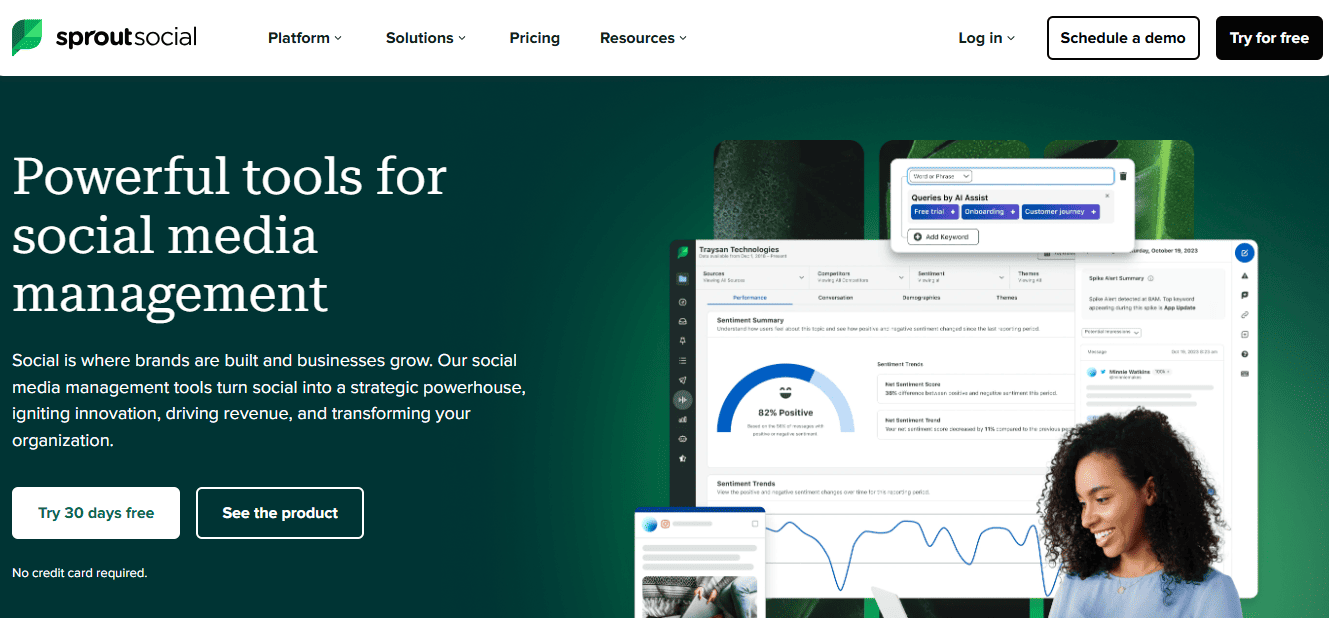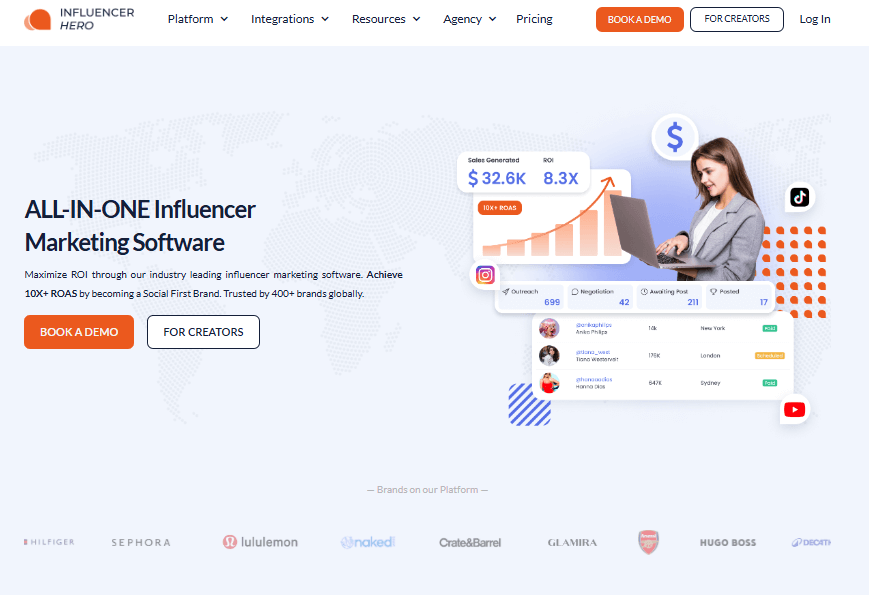


The main difference between Sprout Social and Influencer Hero is that Sprout Social focuses primarily on enterprise-level influencer management and advanced analytics, while Influencer Hero is designed as a complete end-to-end influencer marketing platform built for D2C and eCommerce brands.
Sprout Social offers strong campaign tracking, content approvals, and deep reporting tools (like EMV and competitive benchmarking), but lacks built-in outreach automation or UGC licensing. In contrast, Influencer Hero combines AI-powered influencer discovery, automated email outreach, CRM workflows, gifting, affiliate tracking, and storefronts—making it a single ecosystem where brands can manage every part of a campaign from outreach to ROI tracking.
In this article, we’ll dive deep into the comparison between Sprout Social and Influencer Hero, exploring their features, pricing, pros, and cons to help you decide which is best for your brand’s influencer strategy.
Sprout Social is primarily built for enterprise-level teams that need detailed reporting, EMV tracking, and brand safety insights across multiple campaigns. In contrast, Influencer Hero caters to D2C and eCommerce brands that want an all-in-one workflow — from discovery and outreach to gifting, UGC collection, and ROI tracking — in one connected platform.
Sprout Social uses advanced demographic and engagement filters with a proprietary Brand Fit Score, making it ideal for analytics-heavy teams. Meanwhile, Influencer Hero enhances discovery with AI lookalike matching, fake follower detection, and a Chrome Extension that lets you pull live influencer data directly from Instagram, TikTok, or YouTube — a big plus for smaller teams that prospect daily.
Sprout Social integrates with Gmail and Outlook for manual or semi-automated outreach but lacks full automation flows. Influencer Hero, however, includes AI-personalized email templates, drip campaigns, and CRM boards that automate follow-ups, replies, and creator status tracking — helping brands scale from 10 to 10,000 creators without losing personalization.
Both platforms integrate with Shopify for product seeding and discount codes, but Influencer Hero goes further, supporting WooCommerce and custom eCommerce setups via embedded scripts. It also enables affiliate storefronts where creators can showcase your products and earn commissions — making it more practical for D2C Shopify brands.
Sprout Social offers content approval workflows and downloadable assets but doesn’t include built-in usage rights management — this must be handled through external contracts. Influencer Hero automates UGC collection, categorizes top-performing content, and allows repurposing within campaigns (with creator consent), streamlining ad and content reuse.
Sprout Social shines in enterprise analytics, offering detailed EMV, engagement, and benchmarking reports ideal for corporate reporting. Influencer Hero focuses on ROI visibility, showing real-time clicks, conversions, affiliate sales, and post-performance, so eCommerce teams can instantly see which creators drive actual revenue.
If your brand sells online — whether through Shopify, WooCommerce, or Amazon — Influencer Hero is hands down the better choice. It’s purpose-built for eCommerce and D2C growth, combining influencer discovery, automated outreach, gifting, affiliate tracking, and real-time ROI reporting into one streamlined platform.
Sprout Social, meanwhile, is better suited for large enterprises and agencies that mainly focus on reporting and analytics, not campaign execution. While it offers strong EMV and competitive insights, it lacks the automation, eCommerce connectivity, and affiliate management features that modern D2C teams rely on to scale.
In short: Choose Influencer Hero if you want to automate influencer marketing, drive measurable sales, and manage everything from one dashboard — the smarter, faster, and more scalable solution for today’s eCommerce brands.

Sprout Social is an enterprise-focused influencer marketing and social analytics platform designed to help brands manage campaigns, monitor brand safety, and measure ROI across multiple social channels. It’s best known for its robust analytics, advanced reporting dashboards, and approval workflows that allow large teams to coordinate influencer programs efficiently. While it’s not a full end-to-end influencer platform, Sprout Social excels in data visibility and performance management, making it popular among enterprise marketing teams and agencies handling large-scale campaigns.
1. Brand Fit Score & Influencer Vetting: Sprout Social uses a proprietary “Brand Fit Score” to evaluate influencer relevance based on audience demographics, engagement rate, and historical performance. This is ideal for enterprise teams that prioritize data-backed influencer selection over manual vetting.
2. Advanced Reporting & EMV Tracking: One of Sprout Social’s biggest strengths is its Earned Media Value (EMV) and engagement reporting. It helps marketing teams and agencies measure ROI by quantifying the financial value of influencer mentions and campaign reach — crucial for corporate brands with large ad budgets.
3. Content Approval Workflows: Designed for teams that require multiple stakeholders’ input, Sprout Social provides structured content review and approval flows. This ensures compliance and consistency across influencer posts, especially for regulated industries like beauty, finance, and healthcare.
4. Competitive & Benchmark Analysis: Sprout Social lets you compare your influencer performance and brand mentions with competitors. D2C brands and enterprises use this to identify positioning gaps, assess market share, and measure engagement benchmarks within their vertical.
5. Social Listening & Sentiment Analysis: This feature allows brands to track conversations, hashtags, and influencer mentions to assess public sentiment. It’s especially valuable for consumer brands or PR teams monitoring influencer-driven campaigns or viral content.
Sprout Social is best for enterprise marketing teams, agencies, and established brands that need deep analytics, content approval workflows, and brand safety controls to manage large-scale influencer and social campaigns.
Based on available demo and industry data:
Sprout Social typically requires an annual contract, with no monthly billing options for enterprise accounts.
Sprout Social does not offer any free influencer marketing tools. However, it provides a limited free trial for social media management features (not influencer discovery) upon request for enterprise prospects.

Influencer Hero is an all-in-one influencer marketing platform built specifically for eCommerce and D2C brands. It enables teams to manage the entire influencer workflow — from discovery and outreach to gifting, affiliate tracking, and ROI measurement — within one connected system. What makes Influencer Hero stand out is its deep Shopify and WooCommerce integration, allowing brands to automate product gifting, generate unique discount or affiliate codes, and track real-time sales performance directly tied to influencer campaigns. It’s trusted by startups and enterprise-level D2C companies looking to scale outreach while maintaining personalization and visibility across every campaign touchpoint.
1. AI-Powered Influencer Discovery: Influencer Hero’s database covers 200M+ creators across Instagram, TikTok, YouTube, and more, with advanced filters like engagement rate, follower authenticity, niche, and location. Its AI lookalike feature helps brands like Shopify startups find creators similar to their top performers — saving hours of manual research.
2. Automated Outreach & CRM Integration: Unlike most tools, Influencer Hero fully automates email outreach, follow-ups, and reply tracking through built-in CRM pipelines. This allows marketing teams to manage relationships at scale — for example, automating outreach to 1,000 micro-influencers while personalizing every message through AI templates.
3. Seamless eCommerce Integration (Shopify, WooCommerce & Custom Stores): For D2C brands, Influencer Hero directly integrates with Shopify and WooCommerce to automate product gifting, affiliate code creation, and order tracking. Based on our demo data, Shopify users reduce manual campaign setup time by over 60% compared to managing influencers manually or via spreadsheets.
4. UGC Collection & Rights Management: Influencer Hero makes it easy to collect user-generated content and manage creator permissions for paid usage. With its UGC Content library, brands can automatically gather influencer posts, categorize top-performing content, and repurpose them into ads or website visuals — a powerful advantage for brands running Meta and TikTok Ads.
5. Real-Time Reporting & Affiliate Analytics: The platform provides real-time insights into clicks, sales, conversions, and ROI from every influencer. D2C brands use these analytics to identify which creators drive actual revenue, not just engagement, making it ideal for data-driven marketers focused on performance and profitability.
Influencer Hero is best for eCommerce and D2C brands on Shopify, WooCommerce, or Amazon looking to scale influencer, gifting, and affiliate campaigns in one streamlined system with complete visibility on ROI.
Influencer Hero offers flexible pricing designed for brands at different stages of growth:
Plans are billed monthly, with discounts available for annual subscriptions. No long-term contracts are required, making it a strong fit for growing D2C teams that need flexibility.
Influencer Hero offers several free tools to help brands get started with influencer marketing:
When comparing Sprout Social and Influencer Hero, the difference ultimately comes down to focus and functionality. Sprout Social is built for enterprise teams and agencies that prioritize reporting depth, EMV tracking, and brand safety. However, it lacks built-in outreach automation, eCommerce integrations, and affiliate tracking, meaning additional tools are often needed to manage the full influencer lifecycle.
On the other hand, Influencer Hero offers a truly end-to-end influencer marketing solution tailored for Shopify, WooCommerce, and Amazon brands.For D2C brands aiming to scale efficiently while keeping visibility across every campaign stage, Influencer Hero is the clear winner.
Ready to see how Influencer Hero can help you scale your influencer and affiliate campaigns? Book a free demo today and experience the platform in action.
Schedule a Demo with one of our media experts below.